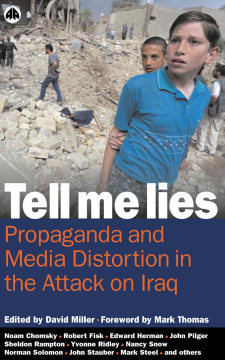
Additional Information
Book Details
Abstract
Did the US and UK governments lie about weapons of mass destruction to promote an attack on Iraq? Did the media hold them to account or act as cheerleaders for war?
Tell me Lies reveals the systematic propaganda used by both the US and UK governments to convince us of the 'threat' from Iraq. It shows how we were deliberately misled into a war that has resulted in a humanitarian disaster in Iraq and threatens to create further instability and resentment of the US and UK throughout the Middle East.
Written by some of the world's leading journalists and commentators, it's a scathing indictment of the role of the mainstream media in legitimising government actions and undermining dissent. Critics, activists and journalists from both sides of the Atlantic explore alternatives such as the internet and Al Jazeera and provide analysis and guidance on resisting the media war.
Contributors include John Pilger, Noam Chomsky, Robert Fisk, Edward Herman, Mark Thomas, Mark Steel, and cartoonist Steve Bell amongst many others.
'If you suspect that the media have not told you the full truth about the Iraq War, read this book. It is a revelation'
Professor James Curran, Goldsmiths College, University of London
'Often entertaining and always informative ... challenges journalists to look closely at the role we play in reporting war'
Tim Lezard, The Journalist
Table of Contents
| Section Title | Page | Action | Price |
|---|---|---|---|
| Contents | v | ||
| Introduction | 1 | ||
| Part I: The Media War | 13 | ||
| 1. A great betrayal | 15 | ||
| 2. The lies of old | 18 | ||
| 3. The case for civil disobedience | 23 | ||
| 4. Crime against humanity | 29 | ||
| 5. The unthinkable is becoming normal | 34 | ||
| Part II: Propaganda Wars | 39 | ||
| 6. War is sell | 41 | ||
| 7. Brainscrubbing: the failures of US public diplomacy after 9/ 11 | 52 | ||
| 8. Misreporting war has a long history | 63 | ||
| 9. Psychological warfare against the public: Iraq and beyond | 70 | ||
| 10. The propaganda machine | 80 | ||
| 11. History or bunkum? | 100 | ||
| 12. Spies and lies | 108 | ||
| 13. No blood for oil? | 115 | ||
| Part III: Misreporting War | 127 | ||
| 14. The minute it's made up, you'll hear about it | 129 | ||
| 15. Reporting the war on British television | 132 | ||
| 16. 9/ 11, spectacles of terror, and media manipulation | 144 | ||
| 17. Look, I'm an American | 157 | ||
| 18. Let the atrocious images haunt us | 164 | ||
| 19. Normalising godfatherly aggression | 176 | ||
| 20. Little Ali and other rescued children | 185 | ||
| 21. Watchdogs or lapdogs? Media, politics and regulation: the US experience | 195 | ||
| 22. The BBC: a personal account | 204 | ||
| 23. Mass deception: how the media helped the government deceive the people | 210 | ||
| 24. Covering the Middle East | 215 | ||
| 25. Why the BBC ducks the Palestinian story | 222 | ||
| 26. Black holes of history: public understanding and the shaping of our past | 232 | ||
| Part IV: Alternatives | 241 | ||
| 27. Al Jazeera's war | 243 | ||
| 28. Target the media | 251 | ||
| 29. Turning my back on the mainstream | 262 | ||
| 30. Inside the system: anti- war activism in the media | 269 | ||
| 31. Disruptive technology: Iraq and the internet | 277 | ||
| 32. The anti- war movement | 286 | ||
| Notes on contributors | 293 | ||
| Index | 298 |
